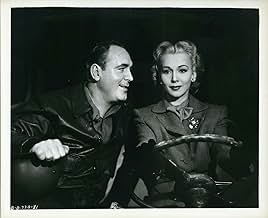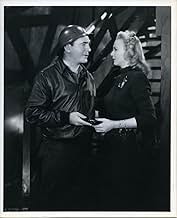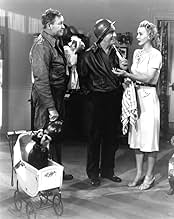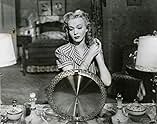IMDb RATING
6.4/10
385
YOUR RATING
A U.S. effort to root out German saboteurs at a shipyard during World War II, sends an undercover intelligence officer to infiltrate as a construction worker and look for possible spies amon... Read allA U.S. effort to root out German saboteurs at a shipyard during World War II, sends an undercover intelligence officer to infiltrate as a construction worker and look for possible spies among the managers and employees.A U.S. effort to root out German saboteurs at a shipyard during World War II, sends an undercover intelligence officer to infiltrate as a construction worker and look for possible spies among the managers and employees.
- Director
- Writers
- Stars
- Nominated for 1 Oscar
- 1 nomination total
Dusty Anderson
- Taxicab Driver
- (uncredited)
Vernon Dent
- Shipyard Worker
- (uncredited)
Mary Gordon
- Mrs. McKenzie
- (uncredited)
- Director
- Writers
- All cast & crew
- Production, box office & more at IMDbPro
Featured reviews
World War II spy thriller, taking place in a ship-building plant, with Pat OBrien, who made a whole lotta movies, mostly war times. Carol Landis, who made a good number of movies, but committed suicide at an early age, shortly after making, ironically, "The Noose". Secret Command was nominated for an Oscar, but was up against "30 seconds over Tokyo" (S Tracy, V Johnson,R Mitchum), so of course, it didn't have a chance. I thought the suspense-full high crane scenes were actually pretty good, considering when this was made, in spite of the liberal use of back-mats throughout the film. The sound also cuts out several times, and I wondered if it was dialogue editing, poor recording quality, or the fault of my local cable company. (was shown on Turner Classic Movies in June 2007). see my entry in message boards for this film for additional observations and shortcomings in the script.
Pat O'Brien shows up on the docks, down and out and in need of a job. His brother Chester Morris, construction manager, reluctantly hires him on. Very soon we discover that O'Brien's real job here is not building ships.
This WWII spy thriller has a bit of romance thrown in and features an assortment of characters whose personal and wartime lives often overlap: Carole Landis and Ruth Warrick are both quite good as women doing jobs that take precedence--at least during wartime--over their personal lives or relationships. Landis is a fellow agent who poses as O'Brien's wife; Warrick is Morris's assistant in the shipyard office. Morris would like to marry Warrick but she may still have feelings for her old flame, O'Brien--whose professional regard for Landis may grow into something more.
Wallace Ford, always fun to watch, is part of "the team"--his main job being spotting Nazis at the shipyard. Barton MacLane is excellent as a rough-edged yard worker whose eventual friendship with O'Brien is hard fought.
The plot is solid: O'Brien and Ford keep an eye out for saboteurs while Morris and Warrick, realizing that O'Brien is no ordinary dock worker, keep an eye on him. There's some comic relief that isn't too funny, unfortunately, and also some cute scenes involving a couple of war orphans that just aren't real convincing.
It's a great role for O'Brien, though, as that rugged American everyman who doesn't say much but performs awesome feats.
This WWII spy thriller has a bit of romance thrown in and features an assortment of characters whose personal and wartime lives often overlap: Carole Landis and Ruth Warrick are both quite good as women doing jobs that take precedence--at least during wartime--over their personal lives or relationships. Landis is a fellow agent who poses as O'Brien's wife; Warrick is Morris's assistant in the shipyard office. Morris would like to marry Warrick but she may still have feelings for her old flame, O'Brien--whose professional regard for Landis may grow into something more.
Wallace Ford, always fun to watch, is part of "the team"--his main job being spotting Nazis at the shipyard. Barton MacLane is excellent as a rough-edged yard worker whose eventual friendship with O'Brien is hard fought.
The plot is solid: O'Brien and Ford keep an eye out for saboteurs while Morris and Warrick, realizing that O'Brien is no ordinary dock worker, keep an eye on him. There's some comic relief that isn't too funny, unfortunately, and also some cute scenes involving a couple of war orphans that just aren't real convincing.
It's a great role for O'Brien, though, as that rugged American everyman who doesn't say much but performs awesome feats.
There are some great scenes at the wharf with shootouts and manhunting and some very hard fights with sledge knuckles and some water incidents - the greatest scene is the rescuing of a man falling down from a great height, and the greatest combat is also in the water with one man drowning, but everything is rather predictable. It's about sabotaging a wharf building ships for transporting American soldiers over seas, and the Nazis are really bad guys, not hesitating to shoot to kill. Fortunately there are also some women involved (the beautiful Carole Landis) and some very sweet kids, who contribute in saving the film. It is worth watching but only barely, mainly for the dramatic fights and incidents at the wharf, but any propaganda film of 1943 could of course only end one way.
These things generally are more interesting for their social history than the cinematic experience. But that history is hot and heavy here.
Its a strange thing to witness, how Hollywood toes the line on perceived social needs, sometimes taking the lead from Washington.
The US entered the war with a strategy not based on valor, or military prowess. It was simply based on outproducing the bad guys. We could make stuff faster than they could blow it up. So industrial sabotage was a real worry. We weren't worried about the Japanese because we simply locked up anyone who looked Japanese.It was the Germans who "looked like us," that were the worry.
So Hollywod ginned up some stories to fit, and this is probably the best of the bunch. The interesting thing here is how far the Irish had come as the prototype American. Only a few decades before, Irish (with Jews) were considered slime. They were quite literally the "other," the non-American.
Its anyone's guess why they rose so quickly. The common theories don't hold much water because we see other groups who behaved much the same way and never achieved the exalted status of the Irish as movie icons. But here we have it in spades: brawling is an honorable, friendly thing. Booze is never mentioned. All the hard working, patriotic, tough souls here are Irish. They win the war with pluck and expect no reward or recognition.
Now, that's a story. Incidentally, though the story, sets and action are pure hokum, that acting here is pretty modern and realistic. I think that's related to the Irish story.
Ted's Evaluation -- 2 of 3: Has some interesting elements.
Its a strange thing to witness, how Hollywood toes the line on perceived social needs, sometimes taking the lead from Washington.
The US entered the war with a strategy not based on valor, or military prowess. It was simply based on outproducing the bad guys. We could make stuff faster than they could blow it up. So industrial sabotage was a real worry. We weren't worried about the Japanese because we simply locked up anyone who looked Japanese.It was the Germans who "looked like us," that were the worry.
So Hollywod ginned up some stories to fit, and this is probably the best of the bunch. The interesting thing here is how far the Irish had come as the prototype American. Only a few decades before, Irish (with Jews) were considered slime. They were quite literally the "other," the non-American.
Its anyone's guess why they rose so quickly. The common theories don't hold much water because we see other groups who behaved much the same way and never achieved the exalted status of the Irish as movie icons. But here we have it in spades: brawling is an honorable, friendly thing. Booze is never mentioned. All the hard working, patriotic, tough souls here are Irish. They win the war with pluck and expect no reward or recognition.
Now, that's a story. Incidentally, though the story, sets and action are pure hokum, that acting here is pretty modern and realistic. I think that's related to the Irish story.
Ted's Evaluation -- 2 of 3: Has some interesting elements.
TCM gave this four stars. It's a 2-1/2 stars film, in my opinion.
Pat O'Brien is Sam Gallagher, a U.S. government agent, a step up from his old job as a foreign correspondent. His brother Jeff (Chester Morris) offers him a job working in a shipyard as a pileback. Piles are poles, driven into the soil by a mechanical device to give a foundation to a structure Sam's purpose is to ferret out a group of Nazi spies trying to sabotage the shipyards. To give him a background, Jill McCann (Carole Landis), who is an FBI agent, poses as his wife, and two small war orphans are brought in as his children.
Jeff is surprised by all this - okay, he hasn't seen his brother in seven years, but something isn't right. He tells Lea Damoran (Ruth Warrick, his girlfriend who used to be Sam's girlfriend) his thoughts.
Sam is able to find out that the yard is going to be blown up the yard while an aircraft carrier is docked. And he begins to learn who the Nazis are in the yard. One problem: His brother's suspicions are drawing too much attention to Sam.
Pat O'Brien for me has never made it as a leading man, yet for some reason, every once in a while he was given a lead role. This is a role for Joel McCrea, John Wayne, that ilk: masculine, solid, and, frankly, kind of a chick magnet. I mean, on one side there's gorgeous Carole Landis, and on the other, his old girlfriend who still has feelings for him.
The story is only so-so, but the final scenes are quite good. The subplot concerning the war orphans is sweet and probably unnecessary.
Carole Landis would be dead only four years later, at the age of 29. I suspect the affair with Harrison was probably the last straw. She was done in Hollywood: she was nearing 30, the cutoff age for actresses back then, there were no more big films thanks to her relationship with Darryl Zanuck ending, she couldn't have children, and at the age of 29, she had already had four husbands. A sad end for a beautiful woman who learned that in Hollywood, you're disposable.
Pat O'Brien is Sam Gallagher, a U.S. government agent, a step up from his old job as a foreign correspondent. His brother Jeff (Chester Morris) offers him a job working in a shipyard as a pileback. Piles are poles, driven into the soil by a mechanical device to give a foundation to a structure Sam's purpose is to ferret out a group of Nazi spies trying to sabotage the shipyards. To give him a background, Jill McCann (Carole Landis), who is an FBI agent, poses as his wife, and two small war orphans are brought in as his children.
Jeff is surprised by all this - okay, he hasn't seen his brother in seven years, but something isn't right. He tells Lea Damoran (Ruth Warrick, his girlfriend who used to be Sam's girlfriend) his thoughts.
Sam is able to find out that the yard is going to be blown up the yard while an aircraft carrier is docked. And he begins to learn who the Nazis are in the yard. One problem: His brother's suspicions are drawing too much attention to Sam.
Pat O'Brien for me has never made it as a leading man, yet for some reason, every once in a while he was given a lead role. This is a role for Joel McCrea, John Wayne, that ilk: masculine, solid, and, frankly, kind of a chick magnet. I mean, on one side there's gorgeous Carole Landis, and on the other, his old girlfriend who still has feelings for him.
The story is only so-so, but the final scenes are quite good. The subplot concerning the war orphans is sweet and probably unnecessary.
Carole Landis would be dead only four years later, at the age of 29. I suspect the affair with Harrison was probably the last straw. She was done in Hollywood: she was nearing 30, the cutoff age for actresses back then, there were no more big films thanks to her relationship with Darryl Zanuck ending, she couldn't have children, and at the age of 29, she had already had four husbands. A sad end for a beautiful woman who learned that in Hollywood, you're disposable.
Did you know
- TriviaThis film was the first and only one produced by Terneen Productions, co-owned by Pat O'Brien and Phil L. Ryan.
- GoofsWhen Red Kelly (Barton MacLane) first meets Jill McGann (Carole Landis), he says, "Nice to meet you, Mrs. Kelly," which is HIS character's last name. A moment later, he calls her by her 'proper' name, Mrs. Gallagher.
- ConnectionsReferenced in Danger Signal (1945)
- How long is Secret Command?Powered by Alexa
Details
- Release date
- Country of origin
- Languages
- Also known as
- Obra destructora
- Filming locations
- Terminal Island, Wilmington, Los Angeles, California, USA(California Shipbuilding Corporation - shipyard scenes)
- Production company
- See more company credits at IMDbPro
- Runtime1 hour 22 minutes
- Color
- Aspect ratio
- 1.37 : 1
Contribute to this page
Suggest an edit or add missing content






































